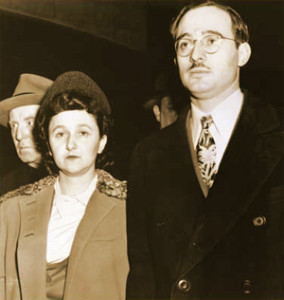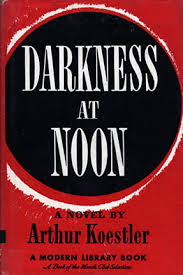Earlier this week, the death of David Greenglass at age 92 was announced in the New York Times. Few Californians today have heard of him or even of the espionage trial of Julius and Ethel Rosenberg in 1951, in which he was a key witness. Yet, both the trial and the subsequent revelations have important lessons for us in California civic and political life today, that should not go uncommented on.
 The Rosenberg case has its roots in the spy investigations of the late 1940s. In early 1950, Klaus Fuchs, a physicist who worked on the Manhattan Project at Los Alamos during World War II to develop the atomic bomb, was discovered to have given classified information on the bomb to the Soviet Union during World War II. Fuchs admitted his action and identified Harry Gold, as his courier, and Gold in turn identified David Greenglass, a former machinist at Los Alamos, as a collaborator.
The Rosenberg case has its roots in the spy investigations of the late 1940s. In early 1950, Klaus Fuchs, a physicist who worked on the Manhattan Project at Los Alamos during World War II to develop the atomic bomb, was discovered to have given classified information on the bomb to the Soviet Union during World War II. Fuchs admitted his action and identified Harry Gold, as his courier, and Gold in turn identified David Greenglass, a former machinist at Los Alamos, as a collaborator.
According to Greenglass, he had been recruited to pass documents to the Soviet Union by his brother-in-law Julius Rosenberg, who for some time had been a Soviet spy. Greenglass and Rosenberg were acknowledged Marxists, active in the Young Communist League in New York in the 1930s and later in the Communist Party.
Julius Rosenberg was arrested for espionage in July 1950, and his wife Ethel later in the year. In 1951, they were tried and convicted of espionage and put to death in 1953. Throughout the trial and until their deaths they vehemently denied spying.
During the Rosenberg’s trial and for more than two decades after, the left in California and especially the left in Hollywood took up the case of the Rosenbergs as demonstration of what was wrong with America. The Rosenbergs were portrayed as ordinary people who were being persecuted by the American government because of their political views. The idea that the Communist Party in Hollywood and California was anything more than a benevolent group in support of the working class was portrayed as a right wing fantasy. Cultural celebrities in Hollywood and California pointed to the Rosenbergs as victims of the Republican Administration of Eisenhower and Nixon.
It was only years later, due to the dedicated research of historians, such as Ronald Radosh and Joyce Milton, and the opening of the Soviet archives following the fall of the Soviet Union, that the left’s representations were revealed to be false. There is no question now that Julius Rosenberg passed classified documents on the atomic bomb to the Soviet Union (Ethel’s role is murkier, and she should not have been given the death penalty). How valuable these documents were in hastening the development of the bomb by the Soviet Union in 1949 continues to be debated, but no issue of culpability remains. Further, as the archives reveal, the Communist Party in California was not an independent worker-friendly group, but working in close collaboration with Moscow (even if the results of this collaboration were minimal, other than a number of bad didactic movies).
Ancient history? Perhaps. But the same ideology, partisanship and ignorance that drove the defense of the Rosenbergs continues to be present among California’s elites; whether it be the long running Hollywood support for Castro’s Cuba, or Sean Penn praising Hugo Chavez, or Ben Affleck or Javier Badam talking about the Middle East. Ideology/partisanship becomes a blinder to truth.
Nor is it only foreign affairs. As is becoming widely noted, ideology and partisanship corrupt today in discussions of domestic issues in California: President Obama is always right and cannot be criticized, or President Obama is always wrong and needs to be always criticized. No different than Dashiell Hammett or Dalton Trumbo without question, blindly following the fabrications of the Rosenbergs.
 In many ways, the Rosenberg case, its aftermath and even the ideology of today is foretold by a book that came out a decade earlier, written by a former Communist Party member, Arthur Koestler. Darkness at Noon published in 1941, is a book with many themes, a chief one of which is the emptiness of ideology. The protagonist, Rubashov, is a Party member who engages in betrayals and brutalities in the name of the socialist utopia, until he is arrested by the Party for being a traitor. He must face the lies he has lived with and suffering caused under the guise of socialism.
In many ways, the Rosenberg case, its aftermath and even the ideology of today is foretold by a book that came out a decade earlier, written by a former Communist Party member, Arthur Koestler. Darkness at Noon published in 1941, is a book with many themes, a chief one of which is the emptiness of ideology. The protagonist, Rubashov, is a Party member who engages in betrayals and brutalities in the name of the socialist utopia, until he is arrested by the Party for being a traitor. He must face the lies he has lived with and suffering caused under the guise of socialism.
The Rosenberg case and especially the truths that came out in subsequent years teach us that certainty, demonizing political opponents, blindly following left or right, can often prove false over time. The announcement of the death this week of the last living principal in this case is occasion to underline this lesson.

